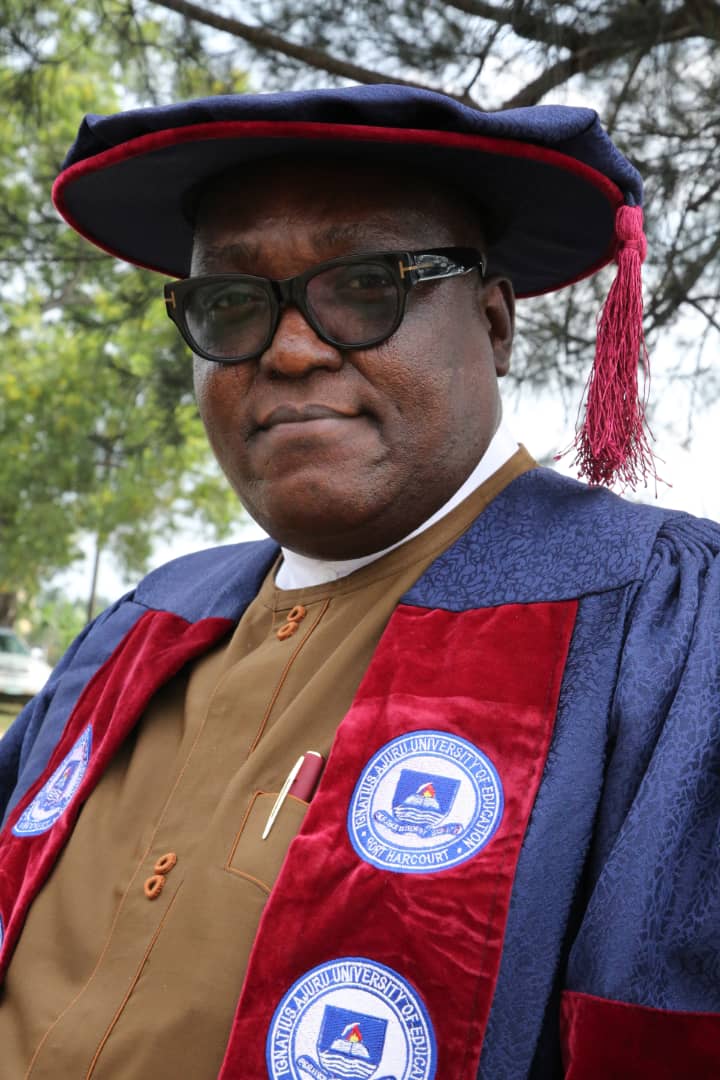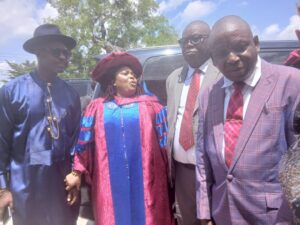City Crime
IAUE Graduates 4,379, Four Bag First Class

A total number of 4,379 students graduated at the 43rd Convocation ceremony of the Ignatius Ajuru University (IAUE) on Saturday.
Of this number, 2,887 fell under Undergraduate category, out of which four bagged First Class Honours, 403 had Second Class Upper, 2,030 came off with Second Class Lower, while 450 had Third Class.

At the Post Graduate category, 374 persons had Post Graduate Diploma (PGD), 812 had Masters, and 306 had Ph.D.
The IAUE Acting Vice Chancellor, Prof. Okechuku Onuchuku, disclosed this on Saturday at the 43rd Convocation ceremony of the institution.
Prof. Onuchuku said that the theme of the convocation, “The University Culture In Practice: The IAUE Experience”, was deliberately picked to tell the story of what the institution stands for.
According to him, the theme “was deliberately chosen to emphasize the need for us to go beyond just academic accomplishment and embrace those cherished traditional and intellectual values for which great universities are known and celebrated.
“IAUE has come of age, and it’s a sign to prove to our stakeholders and development partners that this institution is moving in a positive direction as a proof of our maturity in all facets of academic and administrative activities.”
He highlighted various achievements recorded by the university under his leadership, including full accreditation of 48 out of 65 programmes at the undergraduate level by the NUC.
He also said over 17 new programmes in the school have been resource verified and approved by the NUC.
The Vice Chancellor urged the Rivers State Administrator to look into executing some key projects already approved by the suspended Governor of the State, Sir Siminalayi Fubara.
He listed those projects to include construction and furnishing of two-storey building with 15 classrooms and 18 professorial offices; construction and furnishing of two units of two storey buildings with nine classrooms each; and construction and furnishing of two units of two storey building with four rooms of 336 capacity hostels each.
The visitor to the university and Rivers State Administrator, Vice Admiral Ibok-Ete Ibas (Rtd), in his address asserted that education remains a cardinal pillar of his administration.

Ibas, who was represented by the Secretary to the Rivers State Government, Prof. Ibibia Lucky Worika, expressed delight over the strides recorded so far by the leadership of the university.
“I am pleased to note the considerable strides made under the leadership of the Acting Vice Chancellor, Prof. Okechuku Onuchuku, particularly in programme accreditation, infrastructure renewal, and institutional discipline.
“I commend the university in securing full accreditation for 48 academic programmes, successfully verifying new programmes, and implementing the Nigeria University Commission’s (NUC’s) Core Curriculum Minimum Academic Standards,” he said.
He stated further that these feats “represent not just compliance, but vision. The infrastructure gains, including perimeter fencing, students housing, academic buildings, clean water projects, and resource centre signal a university that is preparing for tomorrow, and not merely coping for today”.
Ibas also commended all other efforts the school authority was making to upgrade the institution, such as partnership with institutions, to develop the school.
“Let me also recognise the impact of partnership with the Niger Delta Development Commission (NDDC), TETFUND, and private donors.
“The donation of Salvation Ministry Hostel, the Chief Emmanuel Aguma building, and the ongoing Institute for Peace and Conflict Studies are commendable and underscore the need for sustainable collaboration between government, private sector, and the academic community”, he said.
The Administrator assured that atttention will be given to all the demands made by the Acting Vice Chancellor.
He advised the graduands to hold on to the values instilled in them by the university.
“As you step beyond these walls into a wider world of possibilities and challenges, I urge you to hold fast to the values instilled in you by the university: integrity, resilience, and unquestionable taste for knowledge”, he stated.
Also speaking, the Chairman of the occasion, and Secretary to the Government of the Federation, Senator George Akume, who was the only recipient of the prestigious and honorary “Dr. of Letters” degree, expressed his appreciation for the recognition, and restated the Federal Government’s commitment to the educational growth of the nation.
Senator Akume, who was represented at the occasion by Prof. Bolaji Babatunde, said the President Bola Ahmed Tinubu’s administration has taken notable steps to set the country’s education on the right path of development.
“The government has taken giant strides to enhance our educational sector, to attain its pride of place. We’re pursuing science and technology, mathematics and medical sciences, reducing the number of out-of-school children, enhancing technical and vocational education and training, advancing girl-child education, harnessing data and digitalisation, and strengthening quality assurance mechanisms in the country’s education.
“The students’ loan scheme has taken off successfully and over 300 students from about 109 universities are already benefitting from the scheme,” he said.
By: Sogbeba Dokubo
City Crime
Fanfare, Pageantry As Ohiauga Community Honours 31 Eminent Personalities with Maiden Leadership Awards

Ohiauga Community in Igburu Clan, Ogba/Egbema/Ndoni Local Government Area of Rivers State, on Saturday, December 27, 2025, witnessed an unprecedented spectacle of celebrations, fanfare and cultural splendour as it honoured 31 distinguished personalities for their outstanding leadership qualities, selfless service and immense contributions to the growth and development of the community.
The historic event, which took place at the Ohiauga Community Town Hall, marked the maiden edition of the Ohiauga Leadership Awards and saw 27 illustrious sons and daughters of the community, alongside four non-indigenes, decorated with various honours in recognition of their unwavering commitment to the socio-economic, political and infrastructural advancement of the area.
From the early hours of the day, the once serene and seemingly sleepy community was transformed into a beehive of activities. The atmosphere was electrified with excitement as the sound of music echoed from different corners of the community. Everywhere was colourful, lively and festive, as men, women, youths and children, young and old, trooped out in large numbers, beautifully adorned in elegant traditional and modern attires.
The favourable weather further added glamour and grace to the occasion, enhancing the beauty and splendour of the event, as the people, stakeholders and visitors savoured every moment of the celebration.
Adding royal splendour to the colourful ceremony was the presence of the Eze of Igburu Clan, Eze Igburu IV of Igburu Land, His Majesty Eze Kenneth Nwabochi, who arrived at the venue in full royal regalia, accompanied by his retinue of chiefs, elders and other palace officials. His presence was a clear testament to the significance of the occasion and underscored the unity and collective resolve of the people to celebrate excellence and service.
One after the other, the award recipients stepped forward amid thunderous applause, cheers and admiration from the audience. These were men and women whose years of dedication, sacrifice and contributions have helped place Ohiauga Community on the map in terms of political relevance, socio-economic growth and self-help-driven development.
Indeed, Ohiauga Community today boasts of notable achievements credited largely to community-based initiatives, including a relatively good road network, stable and uninterrupted electricity supply powered through solar infrastructure, and other basic amenities that have improved the quality of life of its people. The honoured individuals, it was observed, have played significant roles in achieving these milestones, leaving their unmistakable footprints on the community’s development journey.
By honouring them, the community made it clear that the awards were not meant to signal retirement from service, but rather to encourage the recipients to intensify their efforts and continue to give back to their fatherland. Community leaders noted that although progress has been recorded, Ohiauga still faces serious developmental challenges that require sustained commitment and collective action.
Prominent among these challenges is the absence of a functional healthcare facility. The only cottage hospital project in the community, allegedly initiated by Total Energies Limited several years ago, was said to have been abandoned, leaving residents without adequate medical care. The community strongly appealed to the Rivers State Government to intervene and revive the project in the interest of the people.
The education sector was also not spared. The Ohiauga Community Primary School, according to the community, is allegedly in good shape, with a conducive learning environment, but lacks enough classroom teachers, as there is only one government-employed classroom teacher. To fill the void, the community reportedly employed five additional teachers from its meagre resources and currently bears the responsibility of paying their salaries.
These realities, stakeholders explained, provided further justification for the decision to celebrate and honour individuals who have consistently demonstrated commitment to the welfare and development of the community.
Speaking at the ceremony, Chairman of the Organising Committee of the Ohiauga Maiden Leadership Awards, Pastor (Dr) David Chizor Nwaoburu, described the event as a strategic initiative aimed at fostering peace, unity and development, while recognising and rewarding excellence and service.
According to him, the award ceremony was designed to honour eminent personalities who have distinguished themselves in public and private life, and who have continued to make meaningful contributions to the growth of Ohiauga Community.
Dr Nwaoburu, who was himself among the award recipients, said the recognition was intended to motivate the honourees to do more for the community and not to rest on their achievements. He urged them to continue to serve the interests of the people wherever they find themselves and to remain ambassadors of peace and development.
He further reiterated the need for government intervention in the abandoned cottage hospital project and the posting of teachers to the primary school by the state government, stressing that community development in Ohiauga has largely been driven by self-help efforts.
Among those honoured at the event were Pastor (Dr) David Chizor Nwaoburu; former Bursar of Ignatius Ajuru University of Education, Dr Davis Ojima; the Registrar of the institution, Dr Chinonye A. Ajie; Dr Obi Chukwuma Ebenezer Jular; Elder Kemmer Mark Godwin; Dr Nwokoji Chukwuemeka; Mr Nduka Louis Odiegba; Dr (Chief) (Mrs) Ojima; Comrade Chimezie Igwela; Engr Gideon Eke; Chief (Prof) H. A. Ajie; Hon. Sule Igwela; and Dr Obi Nwaoburu.
Others included Prof. (Mrs) Jennifer Igwela; Dr Charity Ajie; Eric David Orukwo; the Paramount Ruler of Ohiauga Community, HRH Dr Amb. Bright Abali; Mr Chukwudi Lloyd Reuben; Comrade Wisdom Adieme; and the member representing ONELGA Constituency I in the Rivers State House of Assembly, Hon. Uchenna Nwabochi.
Also recognised were Comrade Kelvin London Oji; Pastor Smart Brass Maduagu; Chief (Hon.) K. O. Igwela; Harmony Igwela; Comrade Onyemaobi Igwela; and Late Elder Nwaba Maduagu, who received a posthumous award in recognition of his lifetime contributions to the community.
The four non-indigenes honoured for their dedicated services and goodwill towards the community were Hon. Marculey Ogolo; Hon. ThankGod Chibor; Comrade Kingsley Ogu; and Pastor G. Oreke, who was specially recognised as the only dedicated government classroom teacher at Ohiauga Community Primary School.
Reacting to the honour, the Registrar of Ignatius Ajuru University of Education, Dr Chinonye A. Ajie, described the award as a step in the right direction and a thoughtful gesture that encourages service and excellence. He called for harmonious relationships among all segments of the community and pledged his continued support towards education, job creation and collective development.
Former Bursar of the university, Dr Davis Ojima, also expressed gratitude to the community for recognising his contributions, assuring that he would remain committed to promoting peace, unity and sustainable development initiatives in Ohiauga.
Business mogul, Mr Nduka Louis Odiegba, said being honoured by one’s own community carries special significance, describing the recognition as the most cherished among the many awards he has received. He pledged to intensify his contributions to the welfare and development of the people, noting that “charity must begin at home.”
In his royal remarks, the Eze of Igburu Clan, His Majesty Eze Kenneth Nwabochi, emphasised the importance of peace, unity and the preservation of cultural values, describing the maiden Ohiauga Leadership Awards as a timely initiative aimed at strengthening communal bonds and fostering collective progress.
Giving the vote of thanks on behalf of the awardees, Mr Chukwudi Lloyd Reuben, thanked the community for finding them worthy of recognition, and commended the leadership and merit award committee for the excellent packaging of the programme. He urged the awardees to continue with their good work to the community, as the merit awards were a clarion call for more community development involvement and a wake up call for others to emulate the leadership qualities exhibited by the awardees.
Overall, the maiden Ohiauga Leadership Awards ceremony lived up to its billing, serving not only as a platform to celebrate excellence and service but also as a rallying point for renewed commitment to the development of the community, amid resounding jubilation, merriment and cultural pride.
By: Donatus Ebi
City Crime
RSG Ready For 2030 Digital Transformation
City Crime
Industry Braces For Glut And Investor Demands

-

 Sports2 days ago
Sports2 days ago2026 WC: Nigeria, DR Congo Awaits FIFA Verdict Today
-

 Environment2 days ago
Environment2 days agoOxfam, partners celebrate 5 years of climate governance programmes in Nigeria
-
Politics2 days ago
ADC, PDP, LP Missing As INEC Set For By- Elections In Rivers
-
Politics2 days ago
FG’s Economic Policies Not Working – APC Chieftain
-

 Politics2 days ago
Politics2 days ago2027: Diri Unveils RHA LG Coordinators, APC Congress Panel
-

 Politics2 days ago
Politics2 days agoReps To Meet,’Morrow Over INEC’s 2027 Election Timetable
-

 Politics2 days ago
Politics2 days agoGroup Continues Push For Real Time Election Results Transmission
-
Sports2 days ago
Sunderland Overcome Oxford Challenge



